Ideal Humidity Levels for a Comfortable Sleep
A comfortable sleep environment is crucial for overall health and well-being, and humidity plays a significant role in achieving this. Maintaining optimal humidity levels in your bedroom can contribute to better sleep quality, improved breathing, and healthier skin.
The Importance of Humidity for Sleep Quality, Best humidity for bedroom
Humidity refers to the amount of moisture in the air. The ideal humidity level for sleep is between 40% and 60%. This range provides a balance that prevents both dryness and excessive moisture, creating a comfortable and conducive environment for sleep.
Low humidity can lead to dry air, which can irritate your nasal passages and throat, making it difficult to breathe. This can result in a stuffy nose, dry cough, and even snoring. Dry air can also dehydrate your skin, leaving it feeling tight and itchy. On the other hand, high humidity can create a feeling of stuffiness and discomfort, making it difficult to fall asleep and stay asleep. It can also promote the growth of mold and mildew, which can trigger allergies and respiratory problems.
Impact of Different Humidity Levels on Breathing, Skin, and Overall Well-being
- Breathing: Dry air can irritate the respiratory system, leading to symptoms like coughing, sneezing, and congestion. This can disrupt sleep and make it difficult to breathe comfortably. Conversely, high humidity can make it harder to breathe, as the air feels heavy and thick.
- Skin: Dry air can dehydrate the skin, causing dryness, flakiness, and itchiness. This can lead to discomfort and even skin irritation. High humidity, on the other hand, can trap moisture on the skin, making it feel sticky and uncomfortable.
- Overall Well-being: Maintaining optimal humidity levels can improve overall sleep quality, reduce respiratory problems, and contribute to healthier skin. This can lead to a more restful sleep, improved mood, and increased energy levels.
Ideal Humidity Levels for Bedrooms
The ideal humidity level for your bedroom can vary depending on factors such as climate, personal preferences, and health conditions.
- Climate: In dry climates, it’s generally recommended to use a humidifier to increase the humidity level. In humid climates, it’s often necessary to use a dehumidifier to reduce the humidity level.
- Personal Preferences: Some people prefer a slightly drier environment, while others prefer a more humid environment. Experiment with different humidity levels to find what works best for you.
- Health Conditions: If you have respiratory problems, such as asthma or allergies, it’s important to maintain a moderate humidity level to minimize irritation and improve breathing.
Maintaining Optimal Humidity Levels in the Bedroom
Here are some tips for maintaining optimal humidity levels in your bedroom:
- Use a Humidifier: Humidifiers add moisture to the air, which can be helpful in dry climates or during the winter months. There are various types of humidifiers available, including cool-mist humidifiers, warm-mist humidifiers, and ultrasonic humidifiers.
- Use a Dehumidifier: Dehumidifiers remove moisture from the air, which can be helpful in humid climates or during the summer months.
- Ventilate Your Bedroom: Opening windows and doors can help to regulate humidity levels by allowing fresh air to circulate.
- Avoid Overheating: Heating systems can dry out the air, so it’s important to avoid over-heating your bedroom.
- Use Houseplants: Houseplants can naturally humidify the air, adding moisture to the environment.
- Monitor Humidity Levels: Use a hygrometer to monitor the humidity levels in your bedroom and adjust your strategies accordingly.
The Effects of Too Much or Too Little Humidity: Best Humidity For Bedroom

Maintaining the right humidity levels in your bedroom is crucial for a comfortable and healthy sleep. Both excessively high and low humidity can negatively impact your health and sleep quality.
The Effects of High Humidity
High humidity levels in your bedroom can lead to a variety of problems, including:
- Mold Growth: High humidity provides the perfect environment for mold spores to thrive. Mold can grow on walls, ceilings, furniture, and other surfaces, releasing allergens and toxins into the air. Mold exposure can trigger allergies, asthma, and other respiratory problems.
- Allergies and Respiratory Issues: High humidity can exacerbate allergies and respiratory problems by trapping allergens and irritants in the air. Dust mites, pollen, and pet dander can thrive in humid environments, leading to sneezing, coughing, and difficulty breathing.
- Sleep Disruption: High humidity can make it difficult to sleep comfortably. The feeling of dampness and stickiness can be uncomfortable and make it harder to fall asleep and stay asleep.
The Effects of Low Humidity
Low humidity levels in your bedroom can also pose health risks, including:
- Dry Skin and Irritated Airways: Low humidity can dry out your skin, making it itchy and flaky. It can also irritate your airways, leading to coughing, sneezing, and a sore throat.
- Nasal Congestion: Low humidity can dry out your nasal passages, making it difficult to breathe. This can lead to nasal congestion and sinus problems.
- Static Electricity: Low humidity can increase static electricity, which can be annoying and uncomfortable.
- Sleep Disruption: Dry air can irritate your nose and throat, making it harder to fall asleep and stay asleep.
